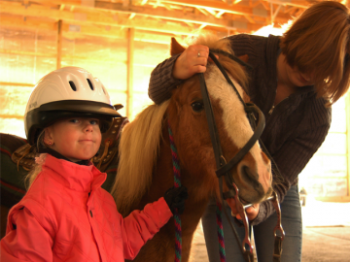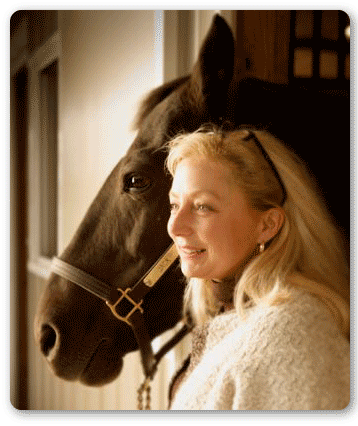Life Lessons With Our Horses

Other owners look to find those horses that are the best athletes, show performers, jumpers, ropers, or have the most "Rolex" stamina. Some are working partners, set to do a daily job on the ranch or farm. Other horses do their job by carrying less fortunate people that feel the joy of riding a horse at a handicapped-riding facility. As I have only mentioned a few relationships, it is clear that our horses fill a diverse field of needs. I have yet to mention one that still remains: the passionate, loving relationship between horse and owner, one that is stronger than other horse and owner relationships. Owning horses lends itself to many obligations; daily feeding and watering, grooming, regular shoeing, vaccines, dentistry, and worming, both financial and animal husbandry responsibilities. Additionally, we know that when we own an animal, we experience the life, and possibly the loss, of that animal. To me, this life lesson is part of the privilege of owning a horse. It's the basis of all of our existence.
This story is about the love our family and granddaughters had with a special pony, Honey.
Two weeks ago our little "Honey"; seemed to not be as ravenous about her handful of grain that complemented her small half leaf of hay for meals. So we kept an eye on her, noticing that she just didn't seem herself. Pawing started, and her appetite diminished within a day. My first thought was colic. But she was not down, rolling or turning her head to her stomach (all signs of the common colic that I have seen). It was time to call our local vet, Dr. Pete Bowen, to see what he thought. The first visit produced uncertainty as to the reason for Honey's behavior. We tried some treatment that helped make Honey more comfortable, leaning more towards colic, but still not able to diagnose the problem. I started thinking about what could have caused this change in her. All of her food was the same, she was in her own turnout - nothing changed there, water was the same, the weather had changed a bit. We had a few cold nights and then back to warm or near hot during the day. I was truly puzzled. All the other horses were fine. As day progressed to night on Saturday, Honey was drastically worsening fast. Now she was lying down, not drinking water or eating food, and she just looked plain sick. I made one more late call to my local veterinarian. I explained our situation and Pete highly suggested a trip to a better facility that could examine Honey more thoroughly. One of our choices was Michigan State University, and I felt it was our best choice considering Honey's state.
As fate would have it, our truck and trailer were in another location being readied to go to one of our largest horse shows, Quarter Horse Congress. I told Pete my dilemma. About half an hour later, my vet, his wife, and two little daughters arrived at our barn. Jane, his wife, pulled in with their truck and horse trailer. Pete followed, and their two little girls tiptoed into my barn quietly. By this time, I had called our daughter and son-in-law, Kristen and Paul. Kristen was coming over; this was their little girls' pony. We all worked fast. My vet from Whitehouse had called Michigan University telling them we were on our way. Kristen, Pete, Jane and I loaded Honey in the straw covered trailer; we got directions and away we went. I cannot see well at night, Kristen had never driven a horse trailer before, but Kristen drove. I gently guided and supported her.
Our drive was a long one.
We left at 11:00 p.m. Saturday night. We headed north to Lansing, MI, Kristen, Honey and I. By 1:30 a.m. we were pulling onto the Michigan State campus. As we drove further, we realized we were definitely in college territory. There had been a football game, and as we drove closer to the horse clinic, the remains of the game guided us. The street was lined with cups, paper, bottles, and turned waste containers. Kristen and I both looked at each other and smiled. You could feel the enthusiasm of the college students. It broke the ache in our hearts for a few short minutes. We pulled up to the Veterinary Teaching Hospital, and we were immediately greeted and told to bring Honey into the building. A team of six medics waited just inside the clinic. We walked little Honey into a treatment room, and this wonderful team immediately went to work to get vitals, blood and tests. The veterinarian who had been asking his team for tests was finally at a place where he could talk to us. Dr. Brown was extremely knowledgeable, and to the point. He and his team worked harder than any other medical group I have ever witnessed. I felt grateful, and relieved; we could be in no better place than this for Honey's sake. Dr. Brown explained that our little pony was extremely sick. She could have one of three or four problems. He felt that she had colitis, assuring me that there was nothing that we could have done to prevent her illness.
As you may well know, we had only two choices for Honey.
We chose to have Dr. Brown and his team try their best to heal her. By 4:00 a.m., Honey had had all the medicine and treatment that could be given. If she could make it through the colitis, we may then have to fight founder. Dr. Brown would watch Honey through the early morning, and give us a call with her condition. We were all a bit optimistic, so Kristen and I headed home with an empty trailer. I felt good knowing our Honey was at the university. Everyone who was there that night was kind and truly professional. Kristen and I were awed by the care and efficiency of these wonderful people. I am still awed, and never will forget the efforts of the medical team. I am truly grateful to those people. The facility is amazing; tests were taken and back within a matter of minutes. The medical staff was highly trained and worked together so efficiently. Dr. Brown explained everything to us, and answered any and all of our questions.
My husband received the call from Dr. Brown at 9:00 a.m.
Honey did not make it. We all were taken by what happened; fully knowing that with horses, losses can happen. But, Honey had put us all into that category of owners who build a relationship with their horses based on love and affection. I will miss our special pony, but will never forget her. I feel privileged to have had such a sweet animal, loved by our whole family. I am so grateful and thankful for the wonderful, selfless people that gave and helped us when we were really in need of friends. I have always known that there is a special bond amongst "horse people", of which I am truly grateful.
If your horse shows signs of illness, be sure to contact your veterinarian
Veterinarians are the experts that can advise you and care the best for your horses when they are sick. Don't wait if you feel that there is something wrong. Chances are, most problems can be taken care of easily and quickly if you get immediate help. If your horse needs further help, your vet can give you the names of hospitals that will give you the best and most knowledgeable care. When children are around these circumstances, parents and family members can guide them through the questions and hardships of the loss of an "equine friend". Our granddaughters were sad, but they understood what happened to Honey. We lovingly answered all of their questions and then went to the barn to see the other horses and clean stalls. I would like to dedicate this story to all of the equine practitioners that dedicate themselves to helping others. My family appreciates all the late, after hours, hard work that our equine practitioners do for us. What a wonderful time we live in that we have the resources to get the help we need!
Many thanks to Dr. Pete Bowen, D.V.M. and Jane of Bryan, OH, Dr. Roger Spiess, D.V.M. of Whitehouse, OH, and Dr. Brown, D.V.M. and the medical staff of Michigan State University.
 Debbie has over 45 years experience with horses and equine-related businesses. She has owned, trained, boarded horses and run stables at various times in her career. She is a certified fence installer, has given balanced riding lessons, and has shown horses in Western, Western Pleasure, Trail, English, Hunter/Jumper, Fox Hunting, Hunter Trials, Dressage and driving classes. Debbie has been involved in foaling, and just about every aspect of horse ownership possible, and she welcomes your questions and comments. If you are interested in using any articles by Debbie, please send her an email.
Debbie has over 45 years experience with horses and equine-related businesses. She has owned, trained, boarded horses and run stables at various times in her career. She is a certified fence installer, has given balanced riding lessons, and has shown horses in Western, Western Pleasure, Trail, English, Hunter/Jumper, Fox Hunting, Hunter Trials, Dressage and driving classes. Debbie has been involved in foaling, and just about every aspect of horse ownership possible, and she welcomes your questions and comments. If you are interested in using any articles by Debbie, please send her an email.
RAMM Fence Systems, Inc. makes every effort to provide reliable and useful information on horse health, care and products. The statements made on this website are based on years of experience with horses, however, they are based on generalized situations and should not replace diagnosis or treatment by a veterinarian or consultation by a professional. RAMM Fence Systems, Inc. does not assume any legal responsibility. Readers should always consult qualified health care providers for specific diagnosis and treatment.
